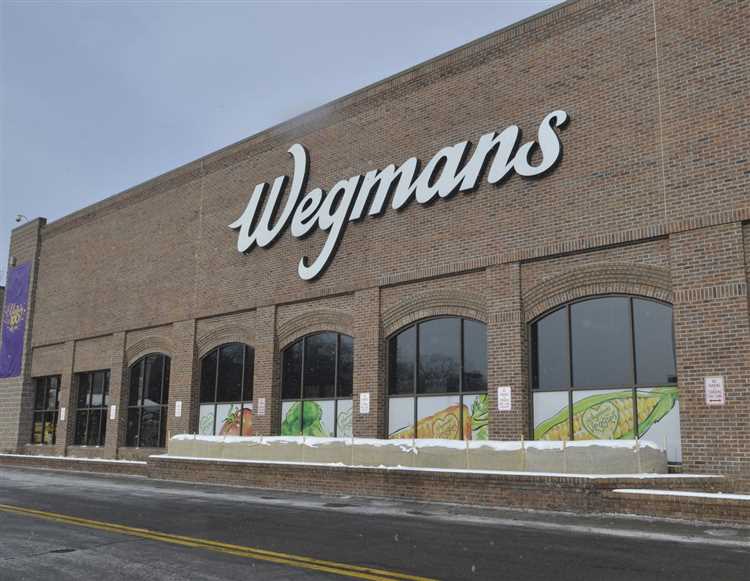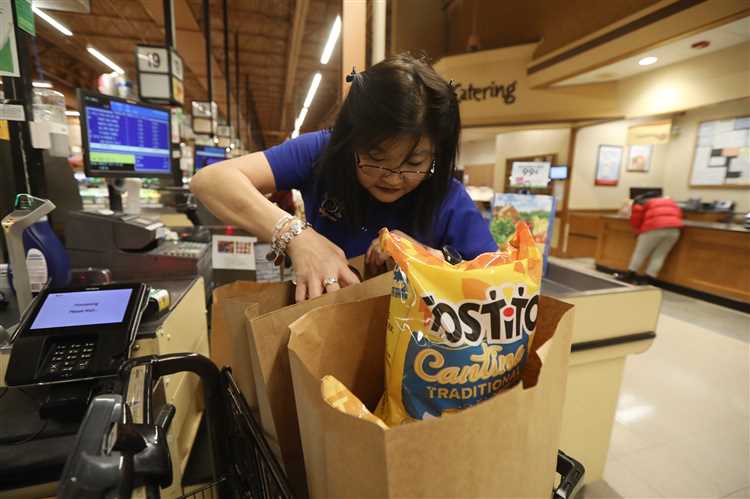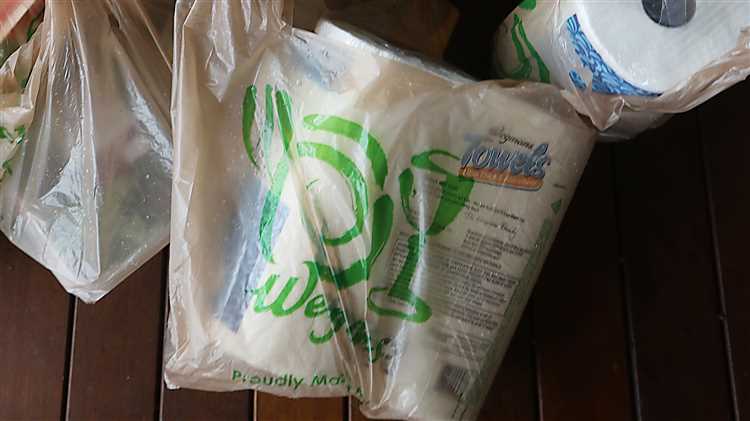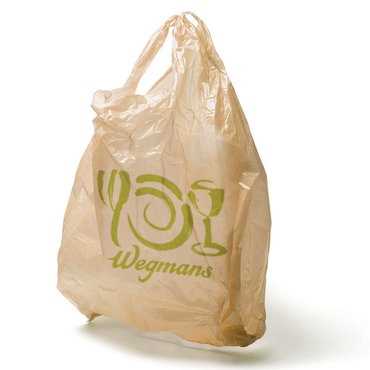Plastic pollution is one of the greatest environmental challenges we face today. The extensive use of plastic, especially single-use plastic bags, has led to severe consequences for our planet. In an effort to combat this issue and promote sustainability, Wegmans, a leading supermarket chain in the United States, has taken the bold step of eliminating plastic bags from its stores. This decision reflects Wegmans’ commitment to environmental responsibility and their determination to be a leader in sustainable retail.
By eliminating plastic bags, Wegmans is addressing a major source of pollution in our ecosystems. Plastic bags are not biodegradable and can take hundreds of years to break down. As a result, they end up in landfills and waterways, harming wildlife and endangering ecosystems. The decision to eliminate plastic bags demonstrates Wegmans’ recognition of the urgent need to reduce plastic waste and protect our environment for future generations.
Wegmans’ commitment to sustainable retail goes beyond just eliminating plastic bags. The company has implemented a range of initiatives to reduce its environmental footprint and promote eco-friendly practices. They have invested in energy-efficient technologies, reduced water usage, and increased recycling efforts in their stores. Furthermore, Wegmans has partnered with sustainable suppliers and prioritizes locally sourced, organic products. By aligning their business practices with their environmental values, Wegmans has created a model for sustainable retail that other companies can aspire to.
Wegmans’ decision to eliminate plastic bags is not only environmentally responsible but also reflects their dedication to providing exceptional customer service. The supermarket chain has introduced reusable bags as an alternative to plastic, providing customers with a convenient and sustainable option. In addition, Wegmans has launched educational campaigns to raise awareness about the importance of reducing plastic waste and encouraging customers to bring their own bags. By putting their customers first and empowering them to make environmentally conscious choices, Wegmans is demonstrating their commitment to both the planet and the communities they serve.
In conclusion, Wegmans’ choice to eliminate plastic bags is a testament to their commitment to environmental responsibility and sustainable retail. By taking this bold step, they are setting an example for other companies in their industry to follow. Wegmans’ dedication to reducing plastic waste, investing in sustainable practices, and serving their customers demonstrates their commitment to promoting a healthier planet for all. As consumers, it is crucial that we support and celebrate companies like Wegmans that prioritize sustainability and take proactive steps to protect our environment.
- Wegmans: A Leader in Sustainability
- Environmental Impact of Plastic Bags
- 1. Pollution
- 2. Resource Depletion
- Plastic Bag Pollution: A Global Concern
- Wegmans’ Commitment to Environmental Responsibility
- The Benefits of Eliminating Plastic Bags
- Conclusion
- Question-answer:
- Why did Wegmans decide to get rid of plastic bags?
- What are the benefits of eliminating plastic bags?
- How are customers responding to the elimination of plastic bags?
- What are some alternatives to plastic bags that Wegmans is offering?
Wegmans: A Leader in Sustainability
Wegmans, a well-known supermarket chain, has established itself as a leader in sustainability within the retail industry. The company has taken significant steps towards reducing its environmental impact and promoting sustainable practices.
One of Wegmans’ most notable initiatives is the elimination of plastic bags from its stores. This decision was made in response to the growing concern about the negative effects of plastic on the environment. By encouraging customers to bring their own reusable bags or providing paper bags as an alternative, Wegmans aims to reduce the amount of plastic waste generated by its operations.
In addition to eliminating plastic bags, Wegmans has implemented various other sustainability measures throughout its stores. For instance, the company has invested in energy-efficient lighting and equipment, reducing energy consumption and greenhouse gas emissions. It has also installed recycling stations in all its locations, encouraging customers to recycle and divert waste from landfills.
Wegmans is also committed to supporting local and organic farmers, promoting sustainable agriculture. The company sources a significant portion of its products from local suppliers, reducing its carbon footprint by minimizing transportation distances. Wegmans also offers a wide selection of organic and sustainable food options, catering to environmentally conscious consumers.
Furthermore, Wegmans actively engages its employees and communities in sustainability efforts. The company provides training and resources to its staff on best environmental practices and encourages them to participate in volunteering activities focused on sustainability. Wegmans also collaborates with local organizations and initiatives to promote environmental awareness and education.
Overall, Wegmans has demonstrated its commitment to sustainability through its various initiatives. By eliminating plastic bags, reducing energy consumption, supporting local suppliers, and engaging employees and communities, the company has positioned itself as a leader in sustainable retail. Wegmans’ dedication to environmental responsibility sets an example for other retailers and serves as an inspiration for consumers to make more sustainable choices.
Environmental Impact of Plastic Bags

Plastic bags have become widely used in retail and everyday life, but their environmental impact is severe. These bags are made from non-renewable resources, primarily fossil fuels like petroleum and natural gas. The manufacturing process for plastic bags creates a significant amount of greenhouse gas emissions and pollution.
1. Pollution

Plastic bags are not biodegradable and can take hundreds of years to break down in the environment. This leads to a significant pollution problem, as discarded bags end up in landfills, waterways, and oceans. Wildlife, including marine animals and birds, often mistake plastic bags for food and can choke or suffocate on them.
Furthermore, the photodegradation process of plastic bags, where they break down into smaller microplastics, further contributes to pollution. Microplastics can enter the food chain when consumed by marine life and subsequently affect human health.
2. Resource Depletion

Plastic bags require the extraction of fossil fuels, which are non-renewable resources. The production and disposal process of plastic bags places a strain on these resources, contributing to their depletion. By choosing more sustainable alternatives, such as reusable bags, the demand for plastic bags can be reduced, lessening the burden on non-renewable resources.
Additionally, the manufacturing of plastic bags requires water and energy, further contributing to resource depletion and environmental impact.
In conclusion, the use of plastic bags has a significant negative impact on the environment, contributing to pollution and resource depletion. By eliminating plastic bags and promoting more sustainable alternatives, like reusable bags, retailers can take important steps towards environmental responsibility and sustainable practices.
Plastic Bag Pollution: A Global Concern
Plastic bag pollution has become a significant global concern in recent years. The widespread use of plastic bags has led to a range of negative environmental impacts that threaten ecosystems and contribute to climate change.
Plastic bags are one of the most visible forms of litter, and they have a long lifespan, taking hundreds of years to break down. As a result, they can accumulate in landfills, rivers, and oceans, posing a threat to wildlife. Marine animals often mistake plastic bags for food, causing them to choke or suffer from internal injuries.
In addition to their impact on wildlife, plastic bags also contribute to greenhouse gas emissions. The production of plastic bags requires the extraction and processing of fossil fuels, leading to the release of carbon dioxide and other pollutants. Furthermore, the disposal of plastic bags in landfills or through incineration releases greenhouse gases into the atmosphere.
Plastic bag pollution has prompted many countries and businesses to take action to reduce their usage. Governments have implemented taxes or bans on plastic bags, while retailers have started offering reusable alternatives. By eliminating plastic bags from their operations, companies like Wegmans are demonstrating their commitment to environmental responsibility and sustainable retail.
Addressing plastic bag pollution requires a comprehensive approach that involves both individual and collective actions. By choosing reusable bags, reducing overall consumption, and supporting efforts to recycle or repurpose plastic bags, individuals can contribute to the global effort to combat plastic bag pollution.
Wegmans’ Commitment to Environmental Responsibility
As a leading retail company, Wegmans has made a strong commitment to environmental responsibility. Recognizing the significant impact of single-use plastic bags on the environment, Wegmans has taken proactive steps to eliminate plastic bags from its stores.
One of the key reasons for Wegmans’ decision to eliminate plastic bags is its dedication to sustainability. Plastic bags are known to have a negative impact on the environment, contributing to pollution, waste, and harm to wildlife. By eliminating plastic bags, Wegmans is reducing its carbon footprint and taking a significant step towards a greener future.
Wegmans understands that the responsibility to protect and preserve the environment goes beyond eliminating plastic bags. The company continuously evaluates its practices and operations to identify ways to reduce waste and minimize its impact on the planet. From sustainable sourcing to energy-efficient operations, Wegmans is committed to making environmentally conscious decisions across its entire supply chain.
The Benefits of Eliminating Plastic Bags

By switching to reusable bags, Wegmans customers are encouraged to make sustainable choices and reduce their own environmental footprint. Reusable bags not only eliminate the need for single-use plastic bags but also contribute to the conservation of natural resources, reduce landfill waste, and prevent plastic pollution in oceans and waterways.
Moreover, eliminating plastic bags aligns with Wegmans’ commitment to customer satisfaction and convenience. Customers can easily carry their groceries in sturdy reusable bags, which are designed to be durable and convenient for shopping trips. Wegmans also offers a variety of reusable bag options to suit different customer needs and preferences.
Wegmans believes that by actively promoting the use of reusable bags and eliminating plastic bags, the company can inspire other retailers and consumers to adopt more sustainable practices. Together, we can work towards a future where plastic pollution is minimized, and the environment is protected for generations to come.
Conclusion
Wegmans’ commitment to environmental responsibility is evident through its decision to eliminate plastic bags. By taking this step, Wegmans is not only reducing waste and pollution but also setting an example for other retailers to follow. Through sustainable practices and a dedication to minimizing their impact on the environment, Wegmans is playing an active role in creating a more sustainable future.
Question-answer:
Why did Wegmans decide to get rid of plastic bags?
Wegmans decided to eliminate plastic bags because of their commitment to environmental responsibility and sustainable retail. They recognized that plastic bags contribute to pollution and harm wildlife, so they made the decision to switch to reusable bags.
What are the benefits of eliminating plastic bags?
By eliminating plastic bags, Wegmans is reducing the amount of plastic waste that ends up in landfills or pollutes our oceans. Reusable bags are a more sustainable option as they can be used multiple times, reducing the need for single-use plastics. It also helps to protect wildlife and the environment by reducing pollution.
How are customers responding to the elimination of plastic bags?
Customers have generally been supportive of Wegmans’ decision to eliminate plastic bags. Many customers recognize the environmental impact of plastic bags and appreciate the switch to reusable options. While there may be some individuals who initially resist the change, overall, the response has been positive.
What are some alternatives to plastic bags that Wegmans is offering?
Wegmans offers a variety of reusable bag options as alternatives to plastic bags. These include tote bags, canvas bags, and insulated bags for keeping groceries cold. They also provide customers with the option to purchase paper bags if they do not have a reusable bag with them. Additionally, Wegmans encourages customers to recycle any plastic bags they may already have.